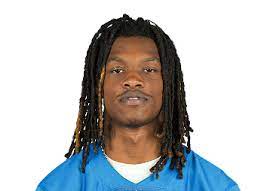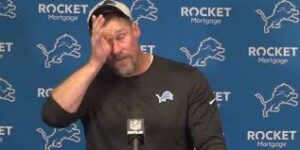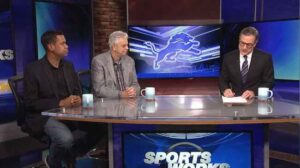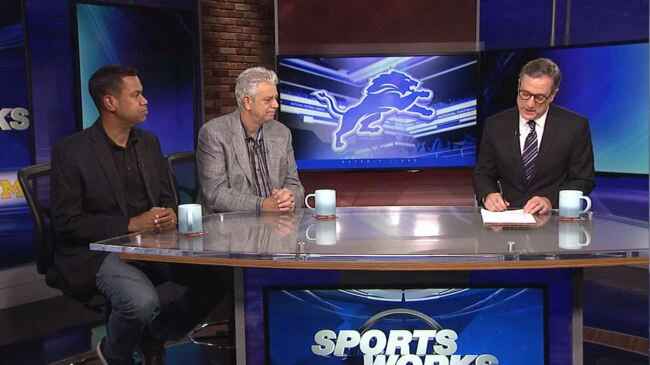Lions 3 Brutal Takeaways from…..
The Denver Broncos lost to the Detroit Lions by a landslide, but what do we know?
If you’re looking for a barometer for Denver’s playoff hopes, the Lions’ 41-point dismantling certainly gives you plenty to ponder. After all, the Broncos were playing on the road, on the short week, and against a team with their own playoff hopes after a long drought. Plus, they were coming off a gut-wrenching loss and needed a win to prove themselves.

The Denver Broncos were found wanting in every area of the game, losing 42-17 to the Detroit Lions. Let’s take a closer look at what we learned in Detroit.
Lack of physicality
The Broncos were unable to match the Lions’ physicality, particularly on defense, and were unable to contain Detroit’s speed. The Lions’ offense was led by quarterback Jared Goff, who completed 24 of 34 passes for 278 yards and five touchdowns, which tied his career high.
Goff moved the ball with ease against a Denver defense that was searching for answers. He distributed the ball well and kept the Denver defense off balance, but receiver Amontee St. Brown was the star of the show, catching seven passes for 112 yards and one score on nine targets in the first half.
Sam LaPorta, a fourth-round draft pick, caught five passes for 56 yards and a pair of touchdowns as Denver’s Josey Jewell endured one of his worst games as a Bronco, allowing LaPorta to catch all five of his targets for 56 yards.
Goff was surgical when it came to in-breaking routes. He completed 14 of 17 passes for 154 yards with all five of his scores coming on those throws.
The combination of Detroit’s ‘thunder’ and ‘lightning’ – David Montgomery and ‘Jahmyr Gibbs’ – was what killed the Broncos. “Gibbs consistently found the outside and turned the corner, creating explosive runs,” he said. “Jahmyr had great contact balance,” he added, “to keep the chains going.”
The tackling ‘effectiveness’ of the Denver defense was poor, especially on the corners, but it wasn’t much better on the linebackers or safeties. “Patrick Surtain II” and “Fabian Moreau” didn’t put in the necessary effort to consistently wrap up and make the expected tackle that would have taken the defense out of the way, and they were exposed in pass coverage.

On the other hand, Moreau’s weakness as a runner has generally been mitigated by Denver’s defensive coordinator Vance Joseph’s play-action game, especially with the emergence of J.Q. McMillian. But missed tackles cost the Broncos big time against the Lions, with P.J., Justin, Simmons, and Jewell all left grasping at straws as Gibbs flew past them time and time again.
On the Lions’ first score, the Lions’ play design used the speed of Gibbs on a wheel to blow out the Denver defense with a quick crossing route that LaPorta caught easily, leading to confusion as Jewell overpursued and gave up the middle instead of funneling it to the sideline.
In the third quarter, with the Lions trailing 28-7 and the defense in need of a stop to allow the offense more time to regroup, the Lions moved the ball quickly with completions from LaPorta to Gibbs, Montgomery and St. Brown, with LaPorta working Surtain for a two-point conversion.
When it comes to Russell Wilson and the future of the Denver Broncos, there’s going to be a lot of talk about the infamous “Payton-dog-cussing” video of coach Sean Payton yelling at Wilson on the sidelines after a Lions field goal that gave Denver a 28-10 lead in the second quarter. But it won’t come down to that one moment, no matter how controversial it was.
In fact, that moment was indicative of how difficult it has been for the two of them to get along at times. You’d think that by Week 15, they’d have gotten back on track.
When it comes to Russell Wilson and the future of the Denver Broncos, there’s going to be a lot of talk about the infamous “Payton-dog-cussing” video of coach Sean Payton yelling at Wilson on the sidelines after a Lions field goal that gave Denver a 28-10 lead in the second quarter. But it won’t come down to that one moment, no matter how controversial it was.

In fact, that moment was indicative of how difficult it has been for the two of them to get along at times. You’d think that by Week 15, they’d have gotten back on track.
The best way to move forward for the Broncos is to use the running back committee more wisely. Perine’s contact-free running style and soft hands make him a better match for Payton’s scheme than Williams’ strengths do. Williams’ longest carry of the game was six yards in the fourth quarter. By the time the game was over, Williams had gained just 15 yards on ten carries, had two catches for negative seven yards, and had totaled just eight yards on the ground in 12 touches.
The offensive line for the Broncos did not play well. Wilson, while his decision making could have been better and he was only sacked twice, was under a lot of pressure in a very short amount of time. Early blitzes and some simulated pressures caused a lot of problems for the offensive line.
On the right side of the line, Mike Mcglinchey gave up a lot of pressure to a player like Aidan Hutchinson, who rushes with power. On the left side, Bolles gave up a bunch of pressure, but recovered on occasion.
It took a lot of effort on Wilson’s part to extend drives, and when it did, it was often with hope rather than anticipation. A third-quarter defensive pass interference was a case in point, extending Denver’s opening drive of the second half and setting up the game’s first touchdown. It was also Denver’s first opening drive score of the third period of the season. There were plenty of opportunities for Wilson to throw it away or get it out quickly, but Detroit’s defense was relentless and dangerous once it had its offense on the scoreboard.


